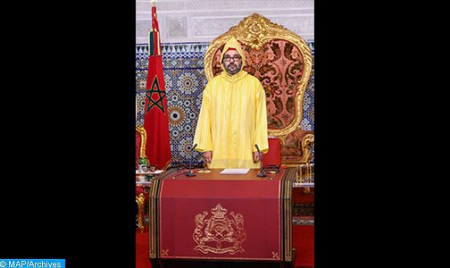
King Mohammed VI has called on the Moroccan Parliament and Government, in place following the Sept.8 general elections, to endeavor for the actual implementation of the development model, and the launch of an integrated set of next-generation projects and reforms, underlining that the development model opens up vast prospects for the work of the government and of parliament.
“We should keep in mind, in this regard, that the development model is not a blueprint for development in the traditional, rigid sense of the term. Rather, it is a general framework which is conducive to action, which sets out new standards and which opens up vast horizons for everyone,” said the King in a speech delivered Friday at opening of the fall session of the Parliament.
The King who expressed hope that “this legislative term will be the starting point for this proactive, ambitious plan, which reflects Moroccans’ collective genius,” said the “National Development Charter” is an important mechanism for the implementation of the development model, in the sense that it involves national obligations before the King and the Moroccan people.
The development model opens up vast prospects for the work of the government and of parliament – all components included.
About the vast prospects opened by the development model, the Sovereign said the new government, whose line up was revealed on Thursday oct.7, is responsible for setting priorities and developing projects during its mandate, in addition to raising the necessary means to finance these projects, within the overall framework for implementing the development model.
King Mohammed VI who has repeatedly insisted on the need to generalize social protection, said “the government is also expected to complete the implementation of the major projects started, especially that of achieving universal access to social protection, which I care deeply about.”
In this regard, the main challenge is to achieve a real overhaul of the health system, in accordance with the best standards, making sure the public and private sectors complement each other.
The same logic should be applied in the reform of public institutions as well as in the overhaul and reform of the tax system, an objective that should be achieved as soon as possible, using a new charter that promotes investment, he said, insisting on the paramount importance of “greater coordination, harmony and synergy between public policies and follow-up to implementation.”
To this end, the Sovereign called for an in-depth reform of the High Commission for Planning to turn it into a mechanism that assists in the strategic coordination of development policies and ensures follow-up to the implementation of the development model, using, in the process, precise criteria and modern follow-up and evaluation methods.
In his speech, the King also highlighted the resilience shown by the Moroccan economy in a troubled region, amid a difficult global context marked by the pandemic’s repercussions.
The pandemic had an unprecedented impact on the Moroccan economy but thanks to measures spurred by the Sovereign, the economy is on track to recovery.
“The growth rate is expected to exceed 5.5% in 2021 – a rate which we have not seen in many years and which is among the highest at regional and continental levels,” the King said, noting that inflation was kept at 1% “which is significantly lower than the high inflation rates seen in a number of countries in the region.”
The rise in exports and remittances by Moroccans abroad enabled the Kingdom to have a comfortable level of foreign exchange reserves covering 7 months of imports, he said, adding that these indicators boosted confidence of families and investors in the Moroccan economy whose outlook is now promising, said the King.
